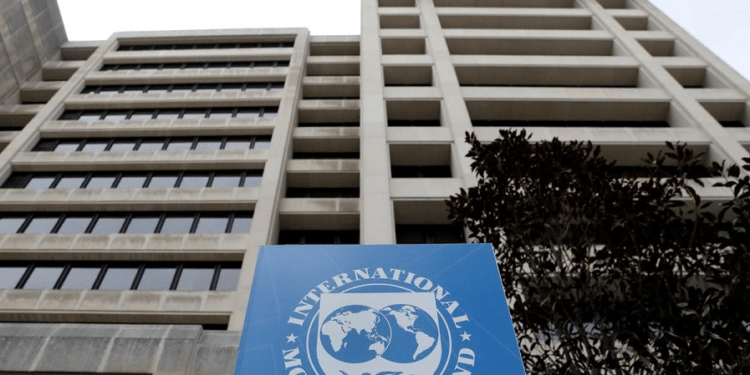IMF Forecast: Nigeria's Inflation to Peak at 44%
The International Monetary Fund (IMF) has presented a bleak picture of Nigeria's economic future in its most recent post-financing assessment report.
The IMF issues a warning: if the Central Bank of Nigeria (CBN) does not drastically tighten its monetary policy, Nigeria's inflation rate could skyrocket to an unprecedented 44%.
According to a scenario where the naira continues to be severely pressured and is further affected by the possibility of a climate shock striking the country early in 2024, this alarming rate of inflation is projected.
The report presents a worrisome chain of events that could seriously destabilise Nigeria's economy due to a combination of persistent pressure on the naira, insufficient monetary tightening, and unfavourable weather.
The IMF predicts that in 2024, the value of the naira may decline by 35%, which would increase inflationary pressures.
The IMF noted:
-
“An adverse scenario of an inflation-depreciation spiral combined with a climate shock would increase risks to Nigeria's capacity to repay the Fund. Staff presented a downside scenario to the authorities with the following features:
-
“Monetary policy is tightened insufficiently to bring down inflation below 20% and pressures on the naira persist. In addition, Nigeria is hit by another adverse climate shock in early 2024 (following severe flooding in late 2022) that exacerbates the current weakness in agriculture and leads to a decline in output and a surge in food prices.
-
“Given the absence of local production and the recent liberalization of commodity imports, the exchange rate would likely depreciate further—by an estimated 35% in 2024—and contribute to a further sharp rise in inflation, peaking at 44%, before monetary policy is eventually tightened sharply.”
Additional Understanding
In the official market, the value of the Nigerian Naira significantly dropped against the US dollar, ending the week at a concerning rate of N1,537.96/$1. The decline in the value of the currency is ascribed to ongoing demand pressures, which are further emphasised by the sharp 74% decline in forex turnover to $84.10 million. The naira has difficulties due to the depreciation of both official and parallel market prices, which raises concerns about the viability of the country's economy. This decline in FX liquidity makes these problems worse.
Nigeria's economic problems were exacerbated when the National Bureau of Statistics (NBS) revealed a sharp spike in inflation to 29.90% in January 2024, up from the previous month's 28.92%. The headline inflation rate increased by 0.98% from December 2023 to this date, highlighting the ongoing inflationary pressures that the Nigerian economy is under.
The country's broad money supply increased to a record N78.74 trillion as of December 2023, defying the Central Bank of Nigeria's (CBN) attempts to stabilise the currency via a variety of foreign exchange policies and tightening monetary measures. This is a startling 51% annual rise from N52.16 trillion in 2022, indicating the possibility of further inflationary pressures that might reduce the buying power of Nigerians.
In an effort to combat inflation, the CBN gradually increased the Monetary Policy Rate (MPR) from 11.5% in May 2022 to 18.75% by July 2023. The economy is facing serious hurdles as a result of these measures, which have not yet succeeded in reversing the inflation trajectory. The first Monetary Policy Committee (MPC) meeting of 2024 for the CBN is now the focus; it is scheduled for next week. Governor Yemi Cardoso is the centre of attention, as she is anticipated to discuss the central bank's position on interest rate rises and its approach to controlling growing inflation.
The significance of this conference lies in the possibility of a policy disagreement between Governor Cardoso's direction and President Bola Tinubu's plan to cut interest rates in Nigeria, at a time when cogent economic measures are crucial.
![]() IMF Forecast: Nigeria's Inflation to Peak at 44%
IMF Forecast: Nigeria's Inflation to Peak at 44%
Here's an overview:
- Understanding Inflation in Nigeria
- Causes of Inflation in Nigeria
- Impact of Inflation on Businesses
- Effects of Inflation on Consumer Spending
- Inflation's Effect on Investments
- Inflation's Impact on Unemployment
- Government Policies to Combat Inflation
- The Role of the Central Bank in Managing Inflation
- Strategies for Individuals to Cope with Inflation
- Long-Term Outlook and Solutions
Understanding Inflation in Nigeria
- Inflation in Nigeria is expected to reach a peak of 44% according to the International Monetary Fund (IMF).
- Factors contributing to this high inflation rate include supply chain disruptions, rising food prices, and fuel subsidy removal.
- The Nigerian government is implementing measures to address inflation, such as tightening monetary policy and promoting agricultural production.
- Understanding the root causes of inflation is crucial for formulating effective policies to stabilize prices and support economic growth.
- Monitoring inflation closely will be essential to managing its impact on the economy and the welfare of Nigerian citizens.
Causes of Inflation in Nigeria
- High Demand for Goods and Services
- Exchange Rate Fluctuations
- Government Policies and Regulations
- Cost-Push Inflation due to Rising Production Costs
- Dependence on Imports for Goods and Services
Impact of Inflation on Businesses
- Inflation can increase operational costs for businesses.
- Businesses may struggle to maintain profit margins.
- High inflation can lead to decreased consumer spending.
- Businesses may find it challenging to plan for the future amidst inflation uncertainties.
Effects of Inflation on Consumer Spending
- Inflation erodes the purchasing power of consumers, causing a decrease in their real income.
- Consumers may cut back on spending as prices rise, impacting businesses and the overall economy.
- High inflation can lead to uncertainty, prompting consumers to save rather than spend.
- Inflationary pressures can result in higher interest rates, increasing the cost of borrowing for consumers.
- Consumer confidence may decline in high-inflation environments, affecting spending patterns.
Inflation's Effect on Investments
- Inflation erodes the purchasing power of money over time.
- Investors need to earn a return on their investments that is higher than the inflation rate to ensure their real wealth grows.
- High inflation rates can lead to uncertainty in the investment environment, affecting investor confidence.
- Fixed-income investments like bonds may suffer in high-inflation environments as the real return diminishes.
- Real assets, such as real estate or commodities, can act as a hedge against inflation by maintaining or increasing their value.
Inflation's Impact on Unemployment
- Inflation has a direct impact on unemployment rates in Nigeria.
- Rapidly rising prices erode purchasing power, leading to lower consumer demand.
- In order to make up for declining revenue due to inflation, businesses may cut jobs.
- High inflation rates generally coincide with higher unemployment rates.
- Stable prices are crucial for maintaining a healthy job market.
Government Policies to Combat Inflation
- The government can implement tight monetary policies, such as raising interest rates, to reduce the money supply.
- They can also decrease government spending to reduce overall demand in the economy.
- Implementing price controls on essential goods will prevent price gouging.
- Encouraging productivity and increasing the supply of goods to meet demand.
- Strengthening institutions to tackle corruption and improve market efficiency.
The Role of the Central Bank in Managing Inflation
- The central bank plays a critical role in managing inflation by implementing monetary policies.
- Through tools like interest rates and reserve requirements, the central bank aims to control the money supply in the economy.
- By adjusting these tools, the central bank can influence borrowing and spending behaviour, ultimately impacting inflation rates.
- The central bank's goal is to strike a balance between promoting economic growth and keeping inflation in check.
- Constant monitoring and adjustments by the central bank are essential to maintaining price stability and sustainable economic growth.
Strategies for Individuals to Cope with Inflation
- Budgeting: Individuals can create a detailed budget to track expenses and prioritise essential spending.
- Saving: Building an emergency fund can help cushion the impact of inflation on personal finances.
- Investing: Exploring investment opportunities can help individuals hedge against inflation and grow their wealth.
- Debt Management: Paying down high-interest debts can reduce financial strain due to rising prices.
- Seeking Additional Income: Taking on part-time work or freelancing can supplement income and counter inflation's effects.
Long-Term Outlook and Solutions
- The IMF suggests that to address inflation in Nigeria in the long term, structural reforms are crucial.
- These reforms should focus on enhancing the country's investment climate, boosting productivity, and diversifying the economy.
- Improved governance, transparency, and accountability in public institutions are essential to sustainably curbing inflation.
- Implementing prudent fiscal policies and strengthening monetary policy frameworks can contribute to stabilising prices.
- Enhancing social safety nets and targeted interventions for the most vulnerable populations can help mitigate the impact of high inflation on the people of Nigeria.



